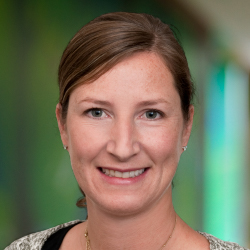Molly C Adrian, PhD

Specialties
- Academic Title: Acting Assistant Professor
- On Staff Since: July 2011
"It is an honor and privilege to work with families and have the potential to impact the lives of adolescents. I am committed to a career dedicated to advancing adolescent suicide prevention because the gaps of understanding are great and the opportunities for impacting lives are profound. My long-term goal is to develop and disseminate innovative interventions that prevent self-injury during adolescence with maximum reach and minimal cost."
-
Biography
Molly Adrian, PhD, was born and raised in St. Paul, Minnesota and set west to explore for her undergraduate studies in Biology and Psychology at the University of Puget Sound. Molly started her post-college career at Seattle Childrens Hospital, which confirmed her desire to pursue graduate studies that would allow her to contribute to the health and well being of children and adolescents. Molly completed her graduate studies at University of Maine, and her residency and fellowship at University of Washington. Molly is now an Assistant Professor at University of Washington and an Attending Clinical Psychologist at the Division of Child and Adolescent Psychiatry at Seattle Childrens Hospital.
Board Certification(s)
Psychology, Clinical Child & Adolescent
Education
University of Maine-Orono Campus, Orono, ME
Fellowship
University of Washington, Seattle, WA
Clinical Interests
CLINICAL INTERESTS: treatment of emotional and behavioral dysregulation in adolescents RESEARCH INTERESTS: the development of emotion regulation, self-injurious behaviors
Research Description
I am a clinical child psychologist actively engaged in a program of research intended to prevent self-injury (including suicidal and non-suicidal self-injury) during adolescence. Suicide is the third leading cause of death for 10-24 year olds and incidence of self-injury increases dramatically during this developmental period. My research aims to integrate patient-centered, evidence-based, and adaptive interventions to augment emotional competence during adolescence and prevent self-injury. The groundwork for my specific research focus was initiated in my graduate program, where I examined influences on emotional development and psychological adjustment in youth, driven by the concept that many forms of psychopathology are initiated, maintained, or exacerbated by maladaptive emotion regulation strategies. Combining my interests in the social influences on the development and consequences of emotion regulation, I conducted a series of studies examining an extreme manifestation of emotion dysregulation: non-suicidal self-injury in adolescents. Due to the grave public health consequences of self-injury, I sought training through the Reproductive Perinatal and Pediatric Epidemiology Training Program to learn how to use public health conceptual models and analytical tools. This two-year fellowship allowed me to advance my knowledge in clinical epidemiology, as well as broadened my expertise in content areas of depression, conduct problems, and a range of self-injurious behaviors incorporating suicidal ideation and attempts. Presently, I am an Assistant Professor in the University of Washington Department of Psychiatry and Behavioral Sciences. My current role has allowed for intensive involvement as a collaborator in a multisite randomized controlled trial examining the efficacy of psychological treatment designed for suicidal adolescents with emotional dysregulation; analysis of longitudinal trajectories of psychological adaptation from childhood to early adulthood; development of adaptive intervention sequences for treatment of adolescent self-injury; and improving risk identification through adolescent-generated social media data.
-
Patient Testimonials
-
Awards and Honors
Loading...Award Name Award Description Awarded By Award Date {{ award.name }} {{ award.description }} {{ award.organization }} {{ award.displayDate }} No Awards and Honors found for Molly C Adrian, PhD
-
Publications
Loading...No Publications found for Molly C Adrian, PhD
-
Presentations
Loading...Presentation Title Event Location Date {{ presentation.title }} {{ presentation.presentedAt }} {{ presentation.location }} {{ presentation.displayDate }} No Presentations found for Molly C Adrian, PhD
-
Research Funding
Loading...Grant Title Grantor Amount Award Date {{ funding.title }} {{ funding.grantedBy }} {{ funding.amount }} {{ funding.displayDate }} No Research Funding found for Molly C Adrian, PhD
-
Clinical Trials and Research Studies
Loading...{{ item.st }}
No clinical trials found for Molly C Adrian, PhD.